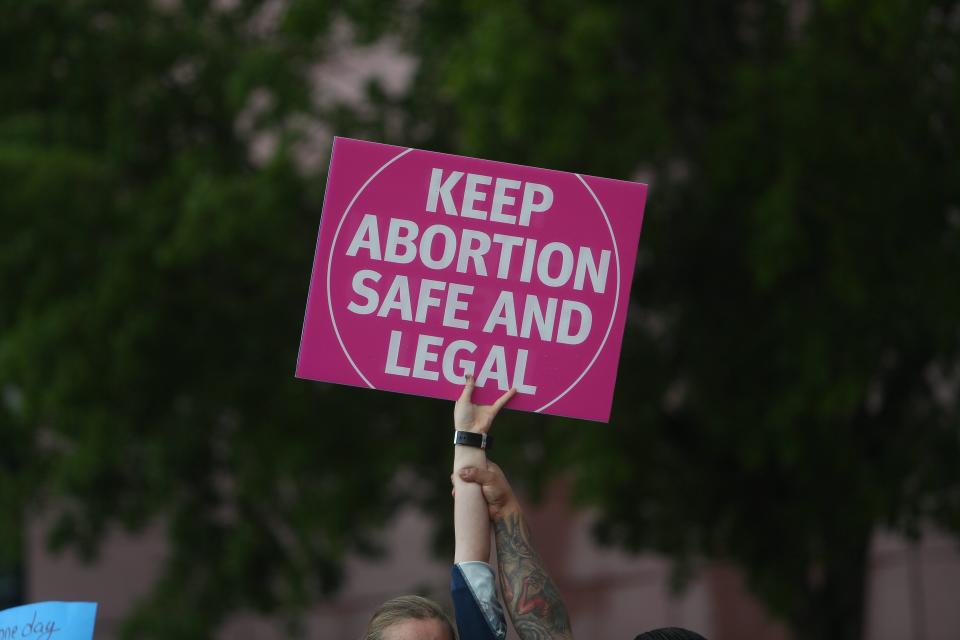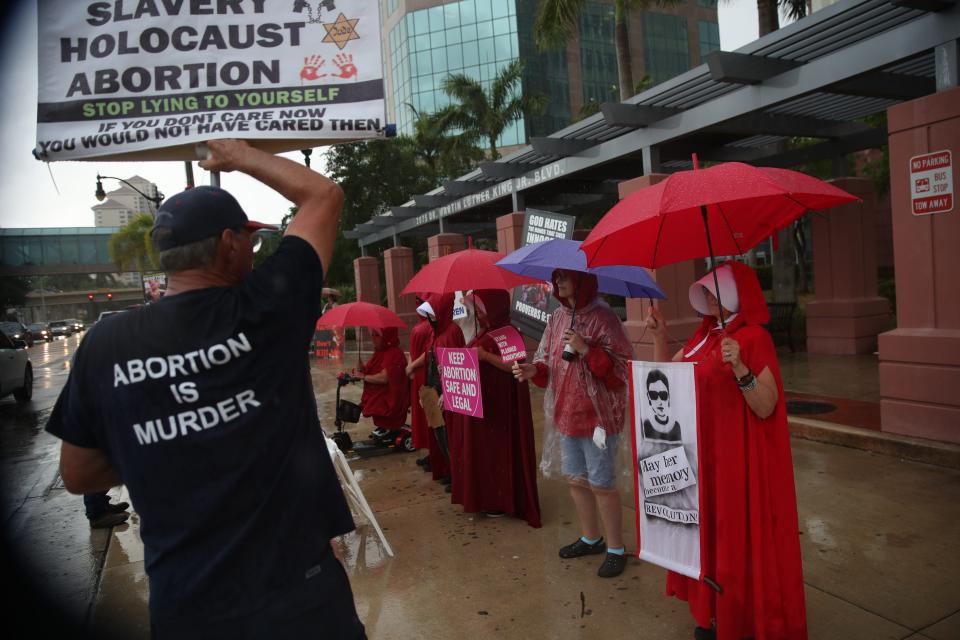Abortion is the word of the hour. But where did it come from?
- Oops!Something went wrong.Please try again later.
Abortion, in addition to being the hot topic in the news cycle after the leak of a draft Supreme Court decision to overturn Roe v. Wade, and a deeply polarizing subject since 1973, is also a word.
It is a fraught word. A triggering word. One of those few words that cause extreme — and opposite — emotional reactions, depending on the hearer.
Just as "socialism" conjures up either a picture of an egalitarian paradise or a dictatorship, just as "fundamentalism" suggests either a Christian heaven or a civil rights hell, so "abortion" is a word that causes some people to shudder — and others to imagine a better, more sensible world of reproductive freedom.
Why? And why this loaded word, for an artificially terminated pregnancy?
"It comes into English from the Latin," said Grant Barrett, a linguist and lexicographer, and co-host of the public radio show "A Way With Words" (4 p.m. Saturdays on WNYE 91.5).
"In Latin, it referred to a miscarriage, or the procuring of a miscarriage," he said.

"Abortio" — a miscarriage, induced or otherwise — and "abortiuum" — an abortifacient, a substance that induces abortion — go back at least as far as the seventh century A.D., according to the Oxford Latin Dictionary. Certain plants such as silphium and rue were cited, in the medical lore of the day, as having abortifacient properties. "In books, you often find drugs mentioned that are capable of doing this," Barrett said.
What Latin speakers, two millennia ago, thought about abortion is another matter.
Did the word "abortio" have the connotations that its opponents fastened onto it in the modern era? Did it evoke sin, crime, shame?
No question that it has those associations for many of us, now. A single exchange from "The Godfather: Part II" (1974) says it all.
"It wasn't a miscarriage. It was an abortion. An abortion, Michael. Just like our marriage is an abortion. Something that's unholy and evil. I didn't want your son, Michael! I wouldn't bring another one of your sons into this world! It was an abortion, Michael!"
As we see, Kay (Diane Keaton) drills down on the word. To Michael Corleone (Al Pacino), a Catholic, and a Sicilian whose culture puts a premium on producing a son and heir, abortion is the worst conceivable crime.
But even those of us who are not kingpins of a criminal empire might find something disquieting in that word.
When we talk about an "aborted" mission, it's often in the context of a failed military operation, or an exploding rocket. Something, at any rate, not good. When we talk about a person, a movie, an idea as "an abortion," it's not a compliment.
Actually, those uses of "abort" evolved from the medical term, not the other way around, Barrett notes. "All the non-medical, non-body, non-fetus uses of 'abort' derive from that," he said.
Abortion, in short, is not a word that has changed a lot in 1,500 years.
"My impression is, the semantic change has not gone that far from the original idea," said Gerald Cohen, an etymologist at the Missouri University of Science and Technology. "When you're calling someone an 'abortion,' you're still thinking very concretely about an actual abortion."
Matters of Fact: To B, or not to b? Why capitalize the 'B' in Black?
Obit: Eric Boehlert helped us become more media-literate. Here's how we continue his work
Old English
"Abortion" seems to have come into the English language around 1537. But for some time it appears to have been the general term for any pregnancy that didn't come to term — human intervention or no.
"An vtimely byrthe, nigh to the conception, which may be called aborsion," is a 1538 reference cited in the Oxford English Dictionary. "Abhorsion is when a woman is delyvered of her chylde before her tyme" is from 1547.
A word that has fallen into disuse — but might be profitably revived now — is "effluxion." A first-trimester abortion. It first appears in a Greek medical text of 1615. "Even at the time, people were drawing lines about what was acceptable," Barrett said.
In later centuries, abortion came to be understood as an induced miscarriage. But for a long time, some references at least suggested a casual, morally neutral view.
"I purchas'd and gave her such Drugs as could cause Abortion, but in vain, and she grew big," wrote the novelist Penelope Aubin — a woman, take note — in the 1726 novel "The Life and Adventures of the Lady Lucy." "The Women by the use of certain herbs procure frequent abortions," wrote William Robertson in his 1778 "The History of America."

It is in the 19th and 20th centuries, the age of Victorians and the Comstocks, that we begin to hear about "criminal abortion" (London Examiner, 1825) and "the sin of abortion" (Salt Lake Tribune, 1900).
It was in this period, too, that abortion came to refer not to a miscarriage or a drug-induced termination of pregnancy but to a specific medical procedure involving surgical intervention.
A procedure that those who believe it to be a sin are poised to take away — sometime this summer — from those who believe it to be a right.
"In the end, this isn't a linguistic issue, it's a human issue," Barrett said. "That's where the larger debate will be settled."

Jim Beckerman is an entertainment and culture reporter for NorthJersey.com. For unlimited access to his insightful reports about how you spend your leisure time, please subscribe or activate your digital account today.
Email: beckerman@northjersey.com
Twitter: @jimbeckerman1
This article originally appeared on NorthJersey.com: Abortion: Definition, history of word amid Roe v. Wade law

